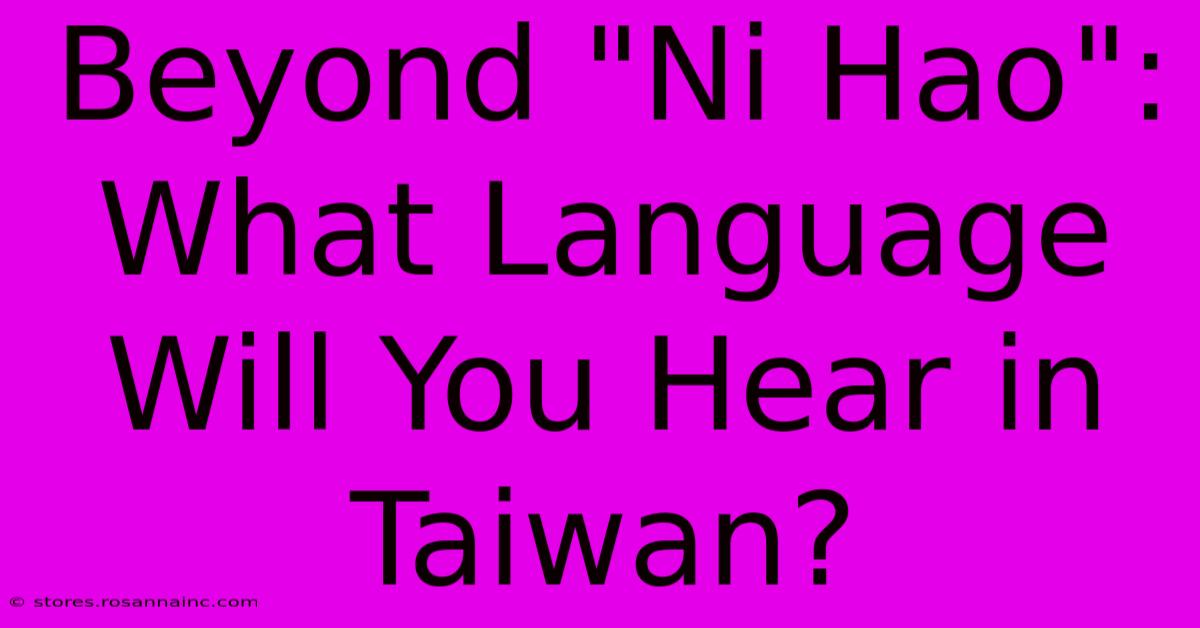Beyond "Ni Hao": What Language Will You Hear In Taiwan?

Table of Contents
Beyond "Ni Hao": What Language Will You Hear in Taiwan?
Taiwan, a vibrant island nation brimming with culture and history, often sparks curiosity about its language. While "Ni Hao" (你好), the Mandarin Chinese greeting, is widely understood, it only scratches the surface of the linguistic landscape. This article delves deeper, exploring the fascinating mix of languages you'll encounter in Taiwan and understanding their significance in shaping the island's unique identity.
Mandarin Chinese: The Official Language
Mandarin Chinese (國語, Guóyǔ) is the official language of Taiwan and is widely spoken across the island. It's the language of government, education, and most media. While the pronunciation and some vocabulary might differ slightly from Mandarin spoken in mainland China, mutual intelligibility is generally high. Learning some basic Mandarin phrases will significantly enhance your trip. You'll find it incredibly useful for navigating daily life, interacting with locals, and exploring the country.
Beyond the Basics: Understanding Mandarin Nuances in Taiwan
While Mandarin forms the backbone of communication, understanding its nuances within the Taiwanese context is key. This includes:
- Taiwanese Pronunciation: While grammatically similar to Mandarin spoken elsewhere, Taiwanese Mandarin often features unique pronunciations and intonations.
- Vocabulary Variations: Certain words and phrases might be used differently or have distinct meanings in Taiwan compared to mainland China.
- Informal Speech: You'll encounter more informal and colloquial expressions in everyday conversations, which might not be found in standard Mandarin textbooks.
Taiwanese Hokkien (Min Nan): The Language of the Heart
Often referred to simply as "Taiwanese" by locals, Taiwanese Hokkien (台灣話, Tâi-oân-oē) is a Southern Min Chinese dialect with a rich history and cultural significance. It's the mother tongue for a significant portion of the population and is widely spoken in families and informal settings. While not mutually intelligible with Mandarin, learning even a few basic Hokkien phrases will be warmly received by many Taiwanese and create a deeper connection. You'll often hear it in markets, family gatherings, and local communities.
The Importance of Hokkien in Taiwanese Culture
Hokkien is deeply interwoven with Taiwanese culture and identity. It’s the language of many folk songs, traditional stories, and local expressions, representing a crucial link to the island's past. Hearing Hokkien spoken on the streets reveals a vibrant cultural undercurrent that enriches the Taiwanese experience.
Hakka: Another Important Language of Taiwan
Hakka (客家話, Hak-kâ-vá) is another significant Chinese dialect spoken by a substantial minority in Taiwan. Originating from Southern China, Hakka speakers have a rich history and culture that is distinct from both Mandarin and Hokkien. While less prevalent than Mandarin or Hokkien, encountering Hakka highlights the linguistic diversity of the island.
English and Other Languages
English proficiency is growing in Taiwan, particularly among younger generations and in urban areas. You’ll find English signage in tourist spots and many service industries employ staff with some level of English fluency. However, don't solely rely on English; learning some basic Mandarin is always recommended. Other languages, like Japanese and Indonesian, might also be encountered, reflecting Taiwan's diverse international connections.
Conclusion: Embrace the Linguistic Tapestry
Taiwan's linguistic landscape is a vibrant tapestry woven from Mandarin, Hokkien, Hakka, and other languages. Embracing this diversity will enrich your experience and deepen your appreciation of Taiwanese culture. By attempting even a few words in the local languages, you'll demonstrate respect and open doors to genuine connections with the welcoming people of Taiwan. So, while "Ni Hao" is a good start, be prepared to encounter and appreciate the richer sounds of this captivating island nation. Your journey will be all the more rewarding for it.

Thank you for visiting our website wich cover about Beyond "Ni Hao": What Language Will You Hear In Taiwan?. We hope the information provided has been useful to you. Feel free to contact us if you have any questions or need further assistance. See you next time and dont miss to bookmark.
Featured Posts
-
The Business Of Pleasure Understanding Legal Prostitution In Las Vegas
Feb 09, 2025
-
Unveiling Sarah Mc Brides Past A Journey Of Identity
Feb 09, 2025
-
Maharashtra Election 2024 Your Wiki Guide To A Better Future
Feb 09, 2025
-
Psn Nere Stora Problem
Feb 09, 2025
-
7 6 Magnitude Earthquake Hits Caribbean
Feb 09, 2025
